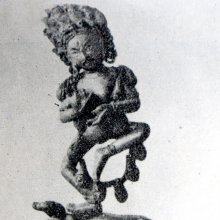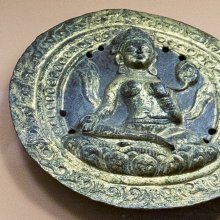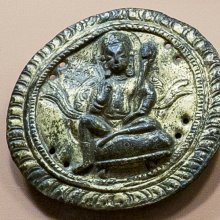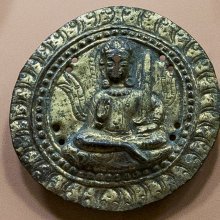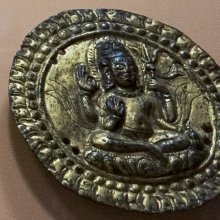Thief: 1 definition
Introduction:
Thief means something in Hinduism, Sanskrit. If you want to know the exact meaning, history, etymology or English translation of this term then check out the descriptions on this page. Add your comment or reference to a book if you want to contribute to this summary article.
Images (photo gallery)
(+13 more images available)
In Hinduism
Shilpashastra (iconography)
Source: Shodhganga: Elements of Art and Architecture in the Trtiyakhanda of the Visnudharmottarapurana (shilpa)Thieves in a painting follow the guidelines of ancient Indian Painting (citra), according to the Viṣṇudharmottarapurāṇa, an ancient Sanskrit text which (being encyclopedic in nature) deals with a variety of cultural topics such as arts, architecture, music, grammar and astronomy.—In the Viṣṇudharmottarapurāṇa, the rules of Painting of different classes have been elaborately discussed. Some concepts like the presence of thieves, sleeping person etc. are to be drawn in the picture of night. [...]. Thus the Viṣṇudharmottarapurāṇa establishes the fact that even in the pictures; the people belonging to different class and profession [e.g., thieves] were projected with specific attire so that general people can equate the picture with the practical character.

Shilpashastra (शिल्पशास्त्र, śilpaśāstra) represents the ancient Indian science (shastra) of creative arts (shilpa) such as sculpture, iconography and painting. Closely related to Vastushastra (architecture), they often share the same literature.
See also (Relevant definitions)
Ends with: Wheat-thief.
Full-text (+847): Cora, Taskara, Caura, Pataccara, Stena, Steyin, Parimoshin, Kumbhila, Rajanicara, Pratirodhaka, Haraka, Akhanika, Paraskandin, Skandaputra, Atatayin, Adhashcara, Naktacarin, Divabhita, Malimluca, Bhumisprish.
Relevant text
Search found 240 books and stories containing Thief; (plurals include: Thieves). You can also click to the full overview containing English textual excerpts. Below are direct links for the most relevant articles:
Manusmriti with the Commentary of Medhatithi (by Ganganatha Jha)
Verse 8.40 < [Section IX - Stolen Property]
Verse 8.340 < [Section XLIV - Robbery (sāhasa)]
Verse 9.271 < [Section XXXVIII - Treatment of Criminals and their Punishment]
Folklore of the Santal Parganas
Chapter XCVIII - Catching a Thief < [Part I]
Chapter I - Bajun and Jhore < [Part I]
Chapter CXXXVII - The Thief’s Son < [Part III]
Kathasaritsagara (the Ocean of Story) (by Somadeva)
Note on thieves and the history of stealing < [Notes]
Vetāla 14: The Merchant’s Daughter who fell in love with a Thief < [Appendix 6.1 - The Twenty-five Tales of a Vetāla]
The motif of “breaking through the wall” and “digging a tunnel” < [Notes]
The Jataka tales [English], Volume 1-6 (by Robert Chalmers)
Jataka 432: Padakusalamāṇava-jātaka < [Volume 3]
Jataka 405: Baka-Brahma-jātaka < [Volume 3]
Jataka 86: Sīlavīmaṃsana-jātaka < [Book I - Ekanipāta]
Vinaya Pitaka (3): Khandhaka (by I. B. Horner)
The story of a thief (wearing) a garland of fingers < [1. Going forth (Pabbajjā)]
The story of a killer of a perfected one < [1. Going forth (Pabbajjā)]
The story of an thief with a “wanted” notice < [1. Going forth (Pabbajjā)]
Chaitanya Bhagavata (by Bhumipati Dāsa)
Verse 1.4.115 < [Chapter 4 - Name-giving Ceremony, Childhood Pastimes, and Thieves Kidnap the Lord]
Verse 1.4.116 < [Chapter 4 - Name-giving Ceremony, Childhood Pastimes, and Thieves Kidnap the Lord]
Verse 1.4.110 < [Chapter 4 - Name-giving Ceremony, Childhood Pastimes, and Thieves Kidnap the Lord]
.jpg)
